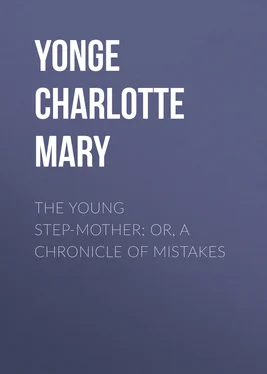Charlotte Yonge - The Young Step-Mother; Or, A Chronicle of Mistakes
Здесь есть возможность читать онлайн «Charlotte Yonge - The Young Step-Mother; Or, A Chronicle of Mistakes» — ознакомительный отрывок электронной книги совершенно бесплатно, а после прочтения отрывка купить полную версию. В некоторых случаях можно слушать аудио, скачать через торрент в формате fb2 и присутствует краткое содержание. Жанр: foreign_prose, literature_19, Европейская старинная литература, foreign_antique, на английском языке. Описание произведения, (предисловие) а так же отзывы посетителей доступны на портале библиотеки ЛибКат.
- Название:The Young Step-Mother; Or, A Chronicle of Mistakes
- Автор:
- Жанр:
- Год:неизвестен
- ISBN:нет данных
- Рейтинг книги:4 / 5. Голосов: 1
-
Избранное:Добавить в избранное
- Отзывы:
-
Ваша оценка:
- 80
- 1
- 2
- 3
- 4
- 5
The Young Step-Mother; Or, A Chronicle of Mistakes: краткое содержание, описание и аннотация
Предлагаем к чтению аннотацию, описание, краткое содержание или предисловие (зависит от того, что написал сам автор книги «The Young Step-Mother; Or, A Chronicle of Mistakes»). Если вы не нашли необходимую информацию о книге — напишите в комментариях, мы постараемся отыскать её.
The Young Step-Mother; Or, A Chronicle of Mistakes — читать онлайн ознакомительный отрывок
Ниже представлен текст книги, разбитый по страницам. Система сохранения места последней прочитанной страницы, позволяет с удобством читать онлайн бесплатно книгу «The Young Step-Mother; Or, A Chronicle of Mistakes», без необходимости каждый раз заново искать на чём Вы остановились. Поставьте закладку, и сможете в любой момент перейти на страницу, на которой закончили чтение.
Интервал:
Закладка:
Few even of the wisest women are fit for authority and liberty so little restrained, and happily it seldom falls to the lot of such as have not previously been chastened by a life-long affliction. But Mrs. Kendal, at twenty-four, with the consequence conferred by marriage, and by her superiority of manners and birth, was left as unchecked and almost as irresponsible as if she had been single or a widow, and was solely guided by the impulses of her own character, noble and highly principled, but like most zealous dispositions, without balance and without repose.
Ballast had been given at first by bashfulness, disappointment, and anxiety, but she had been freed from her troubles with Gilbert, had gained confidence in herself, and had taken her position at Bayford. She was beloved, esteemed, and trusted in her own set, and though elsewhere she might not be liked, yet she was deferred to, could not easily be quarrelled with, so that she met with little opposition, and did not care for such as she did meet. In fact, very few persons had so much of their own way as Mrs. Kendal.
She was generally in her nursery at a much earlier hour than an old-established nurse would have tolerated, but the little Susan, promoted from Fairmead school and nursery, was trained in energetic habits. In passing the doors of the young ladies’ rooms, Albinia gave a call which she had taught them not to resist, for, like all strong persons, she thought ‘early to rise’ the only way to health, wealth, or wisdom. Much work had been despatched before breakfast, after which, on two days in the week, Albinia and Lucy went to church. Sophy never volunteered to accompany them, and Albinia was the less inclined to press her, because her attitudes and attention on Sunday were far from satisfactory. On Tuesday and Thursday Albinia had a class at school, and so, likewise, had Lucy, who kept a jealous watch over every stray necklace and curl, and had begun thoroughly to enjoy the importance and bustle of charity. She was a useful assistant in the penny club and lending library, which occupied Albinia on other mornings in the week, until the hour when she came in for the girls’ studies. After luncheon, she enjoyed the company of little Maurice, who indeed pervaded all her home doings and thoughts, for she had a great gift of doing everything at once.
A sharp constitutional walk was taken in the afternoon. She thought no one could look drooping or dejected but from the air of the valley, and that no cure was equal to rushing straight up one hill and on to the next, always walking rapidly, with a springy buoyant step, and surprised at any one who lagged behind. Parochial cares, visits, singing classes, lessons to Sunday-school teachers, &c., filled up the rest of the day. She had an endless number of ‘excellent plans,’ on which she always acted instantly, and which kept her in a state of perpetual haste. Poor Mrs. Dusautoy had almost learnt to dread her flashing into the room, full of some parish matter, and flashing out again before the invalid felt as if the subject had been fairly entered on, or her sitting down to impress some project with overpowering eagerness that generally carried away the Vicar into grateful consent and admiring approval, while his wife was feeling doubtful, suspecting her hesitation of being ungracious, or blaming herself for not liking the little she could do to be taken out of her hands.
There was nothing more hateful to Albinia than dawdling. She left the girls’ choice of employments, but insisted on their being veritably occupied, and many a time did she encounter a killing glance from Sophia for attacking her listless, moody position in her chair, or saying, in clear, alert tones, ‘My dear, when you read, read, when you work, work. When you fix your eye in that way, you are doing neither.’
Lucy’s brisk, active disposition, and great good-humour, had responded to this treatment; she had been obliging, instead of officious; repeated checks had improved her taste; her love of petty bustle was directed to better objects, and though nothing could make her intellectual or deep, she was a really pleasant assistant and companion, and no one, except grandmamma, who thought her perfect before, could fail to perceive how much more lady-like her tones, manners, and appearance had become.
The results with Sophy had been directly the reverse. At first she had followed her sister’s lead, except that she was always sincere, and often sulky; but the more Lucy had yielded to Albinia’s moulding, the more had Sophy diverged from her, as if out of the very spirit of contradiction. Her intervals of childish nonsense had well nigh disappeared; her indifference to lessons was greater than ever, though she devoured every book that came in her way in a silent, but absorbed manner, a good deal like her father. Tales and stories were not often within her reach, but her appetite seemed to be universal, and Albinia saw her reading old-fashioned standard poetry—such as she had never herself assailed—and books of history, travels, or metaphysics. She wondered whether the girl derived any pleasure from them, or whether they were only a shield for doing nothing; but no inquiry produced an answer, and if Sophy remembered anything of them, it was not with the memory used in lesson-time. The attachment to Louisa Osborn was pertinacious and unaccountable in a person who could have so little in common with that young lady, and there was nothing comfortable about her except her fondness for her little brother, and that really seemed to be against her will. Her voice was less hoarse and gruff since the pond had been no more, and she had acquired an expression, so suffering, so concentrated, so thoughtful, that, together with her heavy black eyebrows, large face, profuse black hair, and unlustrous eyes, it gave her almost a dwarfish air, increased by her awkward deportment, which concealed that she was in reality tall, and on a large scale. She looked to so little advantage in bright delicate colours, that Albinia was often incurring her displeasure, and risking that of Lucy, by the deep blues and sober browns which alone looked fit to be seen with those beetle brows and sallow features. Her face looked many years older than that of her fair, fresh, rosy stepmother; nay, her father’s clear olive complexion and handsome countenance had hardly so aged an aspect; and Gilbert, when he came home at Midsummer, declared that Sophy had grown as old as grandmamma.
The compliment could not be returned; Gilbert was much more boy-like in a good sense. He had brought home an excellent character, and showed it in every look and gesture. His father was pleased to have him again, took the trouble to talk to him, and received such sensible answers, that the habit of conversing was actually established, and the dinners were enlivened, instead of oppressed, by his presence. Towards his sisters he had become courteous, he was fairly amiable to Aunt Maria, very attentive to grandmamma, overflowing with affection to Mrs. Kendal, and as to little Maurice, he almost adored him, and awakened a reciprocity which was the delight of his heart.
At Midsummer came the grand penny-club distribution, the triumph for which Albinia had so long been preparing. One of Mrs. Dusautoy’s hints as to Bayford tradesmen had been overruled, and goods had been ordered from a house in London, after Albinia and Lucy had made an incredible agitation over their patterns of calico and flannel. Mr. Kendal was just aware that there was a prodigious commotion, but he knew that all ladies were subject to linen-drapery epidemics, and Albinia’s took a more endurable form than a pull on his purse for the sweetest silk in the world, and above all, it neither came into his study nor even into his house.
It was a grand spectacle, when Mr. Dusautoy looked in on Mrs. Kendal and her staff, armed with their yard-wands.
Читать дальшеИнтервал:
Закладка:
Похожие книги на «The Young Step-Mother; Or, A Chronicle of Mistakes»
Представляем Вашему вниманию похожие книги на «The Young Step-Mother; Or, A Chronicle of Mistakes» списком для выбора. Мы отобрали схожую по названию и смыслу литературу в надежде предоставить читателям больше вариантов отыскать новые, интересные, ещё непрочитанные произведения.
Обсуждение, отзывы о книге «The Young Step-Mother; Or, A Chronicle of Mistakes» и просто собственные мнения читателей. Оставьте ваши комментарии, напишите, что Вы думаете о произведении, его смысле или главных героях. Укажите что конкретно понравилось, а что нет, и почему Вы так считаете.












